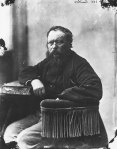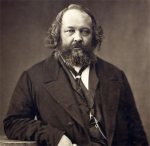This paper attempts to compare and analyze how and in what ways Proudhonian and Bakuninian anarchism are similar or different. It also looks at historical events and incidents in their lives that might have influenced the excitement and evolution of their anarchist thoughts. Proudhon is recognized as the father of modern anarchism whose ideas of property, authority and reaction to Marxism play a foundational thought for later anarchist thinkers including Bakunin. Generally, Proudhon is considered as an individualist anarchist while Bakunin is a collectivist anarchist.


Biographically, one striking difference between these anarchist thinkers is their social backgrounds; Proudhon comes from an ancestry of a peasant family whose father was a craftsman and Bakunin is the first in a line of anarchist thinkers of aristocratic origin. As Woodcock notes, Proudhon’s social and economic background seems to have influenced his thought to a great deal as he focuses on property in society of peasants and small craftsmen and pays little attention to industries.[1] Bakunin was a man who had ‘no sense of property or material security’ and mostly lived on gifts and loans from his wealthy friends and admirer.[2] Woodcock describes Bakunin’s personality traits as eccentric, spontaneous, intelligent, kind, yet naïve and imprudent. Bakunin had a very persuasive oratory skill, which Proudhon lacked, but the later was more learnt and capable of writing than the former.[3] Woodcock thinks that Bakunin was a ‘man of action’ and his eccentricity and unconventionality are lived. Unexpectedly, as Herzen comments, he had ‘no sense of literary architecture,’ and in fact, he did not leave a single book to transmit his ideas to his posterity. On the contrary, Proudhon’s urge to rebellion seems to have fulfilled by his literary activities. This difference between them seems to exhibit their conviction to their ideas, and Proudhon is infamous for his abandonment of his anarchist beliefs when he ran for office and worked in the government for a short period of time.[4] As one would anticipate, this incident made Proudhon fell from grace as many of his followers considered it as a betrayal or at least as a disingenuous act. On the other hand, Bakunin’s consistency and living-the-thoughts personality received a magnetic force of attraction from the multitude and his followers.
With age and intellectual growth Proudhon slowly sheds off his belief in Christianity and converts to atheism, because he realized the ineptitude of the religious of their defense of Christianity.[5] Proudhon’s anti-dogmatism and passion for reason reflects in his essay, ‘What is Property?’ when he proclaims that, “I live, like you, in a century in which reason submits only to fact and evidence”.[6] French socialist thinkers like Charles Fourier and Saint-Simon greatly influenced Proudhon, and later he also interacted with and befriended Karl Marx (briefly), Alexander Herzen and Michael Bakunin.[7] Woodcock notes that Proudhon influenced Bakunin, but reading Bakunin’s ‘Social and Economic Bases of Anarchism’, it seems that Marx also influenced Bakunin significantly. For instance, he argues that “…wealth has always been and still is the indispensable condition for the realization of everything human: authority, power, intelligence, knowledge and freedom.”[8] This clearly embodies the essence of the Marxist notion of historical materialism.
As they interact with Marx and other socialists and speculate on a socialist society of future, Proudhon and Bakunin realized the inherent contradictions embedded in the celebrated Marxist concept of the ‘dictatorship of the proletariat,’ because socialism doesn’t completely liquidate the authority, it just changes the architecture of authority. As Proudhon argues, what is really needed is a ‘thorough transformation of consciousness’; progress doesn’t count as a revolution.[9] Proudhon maintains that the French Revolution of 1789 was only a progress, not a revolution. It didn’t completely liquidate the infrastructure of authority; it only changed the metaphysics of government. Bakunin’s engagement with Marxism and his interactions with Marxist thinkers of the time seem much more thorough and rigorous. The irreconcilable differences between the libertarian anarchism and the authoritarian conceptions of socialism were first realized and developed by Bakunin during and after the First International, which became an important part of Bakunin’s anarchist movement.[10] For Bakunin, every government/state has a two-fold aim: first, preserving and strengthening the state, i.e. systematic and legalized dominance of the ruling class over the exploited people; and the other aim is the preservation of its exclusive governmental advantages and its personnel.[11] Therefor, he concludes that, “…the state is the historic organization of authority and tutelage, divine or human, extended to masses of people in the name of religion, or in the name of alleged exceptional and privileged ability…”[12] Ideally, it seems anarchism is a natural and logical extension to libertarian socialism, not Marxism or state-capitalism because Marxism is not only authoritarian; it only aims for the nationalization of means of production when anarchism strives for the annihilation of the state by advocating for decentralized forms of federalism.
Proudhon realized the reactionary aspect of nationalism and it led him to estrange himself from his Russian friend Alexander Herzen, whose nationalist activities abhorred him. He witnessed the hostility of Belgian patriots and wrote about them. His assumption is that nationalism is not a forward-moving ideology; it is anti-progress.[13] On the other hand, Bakunin was born and grew up in the heat of nationalism in Russia following the Napoleonic invasion of Russia. The thrust of patriotic fervor was very important for Bakunin in that sense. Though Bakunin might agree with Proudhon that it is reactionary and inconsistent with anarchism, he seems to have thought that nationalism is instrumentally valuable for the destruction of the state. His active involvement with the Polish movement seems to indicate and as he wrote in his “Appeal to the Slavs,” that nationalist revolutions had internationalist implications for the success of social revolutions. To Bakunin, the primacy of the social revolution is necessary because a complete breakdown of society is required to start anew.[14] For a true Bakuninist, the complete destruction of an existing society is a necessary prelude to its creation.
Both Proudhon and Bakunin have a federalist vision of future society, but as Woodcock notes, Bakunin’s federalism seems to be based on Proudhonism in many aspects. In a federal anarchistic society, the organization and administration of social relations begin at local and as near as direct control of the people as possible, and where the nation would be replaced by a geographical federation of regions, and Bakunin, in fact, envisioned a United States of Europe.
Reference
Woodcock, George, Anarchism: A History of Libertarian Ideas and Movements, University of Toronto Press, Toronto, 2009.
Horowitz, Irving Louis, The Anarchists, Dell Publishing Co., New Jersey, 1964.
“Jews; make laws against this race, which poisons everything, by mingling into in all affairs without seeking unity with any people. Demand their expulsion, abolish synagogues, reject them at any workplace. The Jew is the enemy of humankind. One must send this race back to Asia or exterminate it. By fire or fusion or by expulsion, the Jew must disappear. What the people of the middle ages hated by instinct, I hate upon reflexion and irrecoverably. The hatred of the Jew… must be an article of our political faith.” -Joseph Proudhon #NotNationalistAtAll